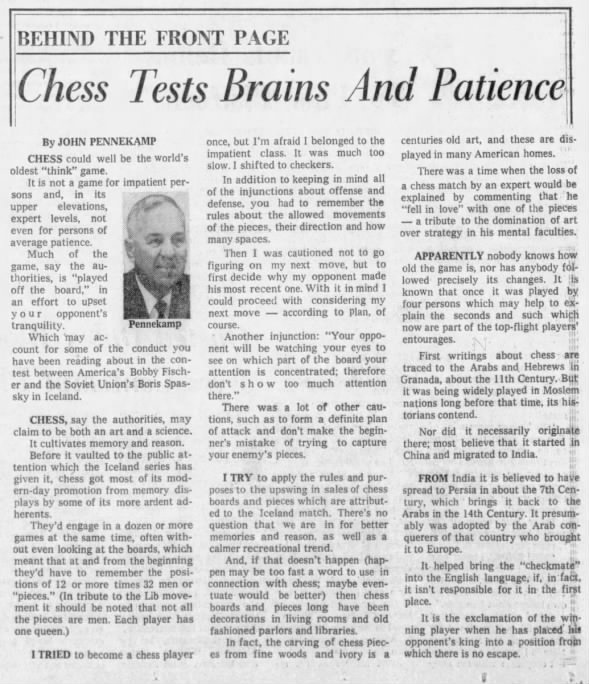The Miami Herald Miami, Florida Tuesday, July 18, 1972 - Page 100
Chess Tests Brains and Patience by John Pennekamp
CHESS could well be the world's oldest “think” game.
It is not a game for impatient persons and, in its upper elevations, expert levels, not even for persons of average patience.
Much of the game, say the authorities, is “played off the board,” in an effort to upset your opponent's tranquility.
Which may account for some of the conduct you have been reading about in the contest between America's Bobby Fischer and the Soviet Union's Boris Spassky in Iceland.
([Examples: USSR selecting Anti-American, Racist Iceland who restricted entry of blacks and news coverage. Fails to elaborate on the finicky, overbearing demands and complaints of European organizers who refused for months to work out details pre-match. Belgrade's illegal demand of 35K USD "guarantee" refused by USCF! Australia's legal $225K bid snubbed by Russia, threatening they "would not play". Schemes to disqualify Fischer and replace with Petrosian, etc.
2nd Game Camera Boycott? “instead of..video tape film that didn't make any noise they had guys with film cameras that were..all around..making a racket..and visually you could see them moving around.”- R.J. Fischer, “Under agreed rules of the match, [Fischer] had the right to object and to demand removal of the cameras if they disturbed him.” -Edmondson, USCF])
CHESS, say the authorities, may claim to be both an art and a science.
It cultivates memory and reason.
Before it vaulted to the public attention which the Iceland series has given it, chess got most of its modern-day promotion from memory displays by some of its more ardent adherents.
They'd engage in a dozen or more games at the same time, often without even looking at the boards, which meant that at and from the beginning they'd have to remember the positions of 12 or more times 32 men or “pieces” (in tribute to the Lib movement it should be noted that not all the pieces are men. Each player has one queen.)
I TRIED to become a chess player once, but I'm afraid I belonged to the impatient class. It was much too slow. I shifted to checkers.
In addition to keeping in mind all of the injunctions about offense and defense, you had to remember the rules about the allowed movements of the pieces, their direction and how many spaces.
Then I was cautioned not to go figuring on my next move, but to first decide why my opponent made his most recent one. With it in mind I could proceed with considering my next move—according to Plan, of course.
Another injunction: “Your opponent will be watching your eyes to see on which part of the board your attention is concentrated; therefore don't show too much attention there.”
There was a lot of other cautions, such as to form a definite plan of attack and don't make the beginner's mistake of trying to capture your enemy's pieces.
I TRY to apply the rules and purposes to the upswing in sales of chess boards and pieces which are attributed to the Iceland match. There's no question that we are in for better memories and reason, as well as a calmer recreational trend.
And, if that doesn't happen (happen may be too fast a word to use in connection with chess; maybe eventuate would be better) then chess boards and pieces long have been decorations in living rooms and old fashioned parlors and libraries.
In fact, the carving of chess pieces from fine woods and ivory is a centuries old art, and these are displayed in many American homes.
There was a time when the loss of a chess match by an expert would be explained by commenting that he “fell in love” with one of the pieces — a tribute to the domination of art over strategy in his mental faculties.
APPARENTLY nobody knows how old the game is, nor has anybody followed precisely its changes. It is known that once it was played by four persons which may help to explain the seconds and such which now are part of the top-flight players' entourages.
First writings about chess are traced to the Arabs and Hebrews in Granada, about the 11th Century. But it was being widely played in Moslem nations long before that time, its historians contend.
Nor did it necessarily originate there; most believe that it started in China and migrated to India.
FROM India it is believed to have spread to Persia in about the 7th Century, which brings it back to the Arabs in the 14th Century. It presumably was adopted by the Arab conquerors of that country who brought it to Europe.
It helped brings that “checkmate” into the English language, if, in fact, it isn't responsible for it in the first place.
It is the exclamation of the winning player when he has placed his opponent's king into a position from which there is no escape.
 Chess Tests Brains and Patience 18 Jul 1972, Tue The Miami Herald (Miami, Florida) Newspapers.com
Chess Tests Brains and Patience 18 Jul 1972, Tue The Miami Herald (Miami, Florida) Newspapers.com
























